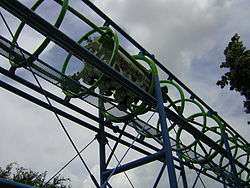Pipeline roller coaster
| Pipeline roller coaster | |
|---|---|
|
Ultra Twister at the defunct Six Flags Astroworld, a TOGO pipeline coaster | |
| Status | In Production |
| First manufactured | 1984 |
| No. of installations | 12 |
| Manufacturers | TOGO, Intamin AG |
| Riders per row | 2 |
| Restraint Style | Over-the-Shoulder |
The Pipeline Coaster is a roller coaster model where the trains ride between the tracks as opposed to a traditional roller coaster where they ride above them. The concept was first developed by Japanese ride company TOGO, and was known as the Ultra Twister. They built six installations of the design, and five are still in operation. Arrow Dynamics created an alternate version of the concept, but it never made it past the prototype stage in development.[1] Intamin also experimented with the pipeline concept and built and relocated one model, known as the Spiral Coaster,[2] but it is no longer operating. Some of the drawbacks of the design include the need for large, uncomfortable over-the-shoulder restraints as well as the obstruction of the riders' view by the enclosed pipe structure.
History
TOGO developed the first Pipeline coaster and the first recorded Ultratwister coaster built was in 1985 at LaQua amusement park in Tokyo, Japan called Ultra Twister. The ride became somewhat popular in Japanese parks, and one year after the first was built, Six Flags purchased one of these coasters for their Six Flags Great Adventure theme park, where it resided until 1990 when it was moved to Six Flags Astroworld until the park closed in 2005. This coaster would remain the only pipeline coaster in America. The American Ultratwister still exists, however it awaits possible future assembly at Six Flags America.
TOGO's model would be the only somewhat successful design. Six of these were made and were successful in small parks due to its small footprint. The ride inverts riders three times through three Heartline Roll elements and utilizes a special near-vertical lift hill. The lift hill would be prone to down time for maintenance and the Ultra Twister owned by Six Flags had its lift hill modified by Premier Rides to a less steep angle when it was moved to Six Flags Astroworld.
Throughout the early 1990s, Arrow Dynamics attempted to develop a pipeline roller coaster. Only one of these was built as a prototype at Arrow's facility in Utah. Plans for the coaster were scrapped altogether due to roughness and other factors. However, one was partially built at Alton Towers in the United Kingdom. In the early 1990s, John Wardley twice attempted to build one of these at the park. The second attempt was partially built, but then scrapped for the coaster Nemesis. The coaster was not completely finished due to Arrow's finance problems.
In the mid 1990s, Intamin built a spiral roller coaster in South Korea. Not much is known about the design, but only one of these coasters were built. The only Spiral Coaster ever built is located in Kuwait, but it has been closed for several years and is considered unlikely to operate again.
Installations
| Coaster | Park | Manufacturer | Opened | Status |
|---|---|---|---|---|
| Ultra Twister Megaton | Greenland | TOGO | 1994 | Operating |
| Spiral Coaster Formerly Sky Plaza Comet | Al-Sha'ab Leisure Park Sky Plaza | Intamin | 2000 1996 | SBNO Closed 1999 |
| Ultra Coaster Formerly Ultra Twister | Marah Land Sabahiya Ikoma Skyland | TOGO | 2008 Unknown | Operating Closed 2005-2006 |
| Unknown Formerly Ultra Twister Formerly Ultra Twister | Six Flags America Six Flags AstroWorld Six Flags Great Adventure | TOGO | N/A 1990 1986 | Defunct (Scrapped) Closed 2005 Closed 1988 |
| Ultra Twister | Washuzan Highland | TOGO | 1991 | Operating |
| Ultra Twister | Nagashima Spa Land | TOGO | 1984 | Operating |
| Ultra Twister | Rusutsu Resort | TOGO | 1994 | Operating |
| Ultra Twister | Tokyo Dome City | TOGO | 1985 | Defunct |
References
- ↑ Wardley, John. "The creation of Nemesis". Alton Towers Almanac. Retrieved 31 May 2015.
- ↑ Marden, Duane. "Sky Coaster (Al-Sha'ab Leisure Park)". Roller Coaster DataBase. Retrieved May 29, 2015.
External links
| Wikimedia Commons has media related to Pipeline roller coasters. |
